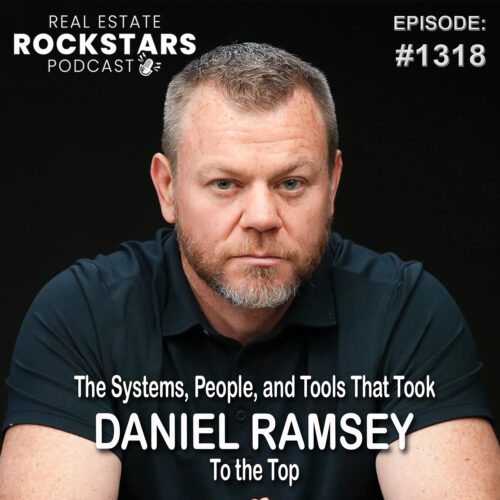With limited inventory, today’s agents are facing fierce competition. Luckily, there are still great opportunities out there for agents who are willing to get a little creative. On this State of the Market podcast, we cover unique ways for agents like you to thrive and futureproof your business. We also discuss recent real estate news, including the story of an agent now in prison for a foreclosure-kickback scheme.
Listen to today’s show and learn:
- Chad’s brief bio [4:05]
- $100 million agent quits Compass after three weeks [5:20]
- Compass’ business strategy [8:19]
- Foreclosure-kickback scheme lands agent in jail [11:16]
- It’s still a seller’s market [18:31]
- Cash buyers at lowest levels since 2007 [23:11]
- Satellite cities outperforming their metropolitan neighbors [25:42]
- Opportunities for agents facing fierce competition [28:43]
- How to break through your goals.
- Plus so much more.
Related Links and Resources:
- Grow Your Real Estate Profits with Our Agent Success Toolbox
- Get Tribe of Millionaires by Pat Hiban and David Osborn for FREE
- Get 6 Steps to 7 Figures by Pat Hiban for FREE
- All The Leads
Thanks for Rocking Out
Thank you for tuning in to Pat Hiban Interviews Real Estate Rockstars, we appreciate you! To get more Rockstar content sent directly to your device as it becomes available, subscribe on iTunes or Stitcher! Reviews on iTunes are extremely helpful and appreciated! We read each and every one of them, please feel free to leave your email so that we can personally reach out and say thanks! Have any questions? Tweet me, Facebook me and ask Pat anything. Don’t forget to head on over to Bare Naked Agent for Pat’s answers, and advice. Thank you Rockstar Nation, and keep rockin!
Read the Full Interview
Aaron Amuchastegui: Real Estate Rockstars welcome back for a Friday morning state of the market, some fun real estate news we’re going to be talking about today. Today, I’ve got my great friend Chad Corbett on here talking. Chad, you’ve got this awesome map behind you. It says travel. Where are you? Where are you tuning in from today?
Chad: This is home-based shockingly. I’m actually in Roanoke Virginia and soon headed to Aspen. Not soon enough, but soon.
Aaron: Yes, sir. I will see you in Aspen next week. We have an awesome GoBundance retreat that going to be there. Chad’s first GoBundance retreat. Chad, you and I, we did deals together in Roanoke years ago. How many years ago was that?
Chad: 2013, 2014. It’s been quite a few.
Aaron: You’re going to go from Virginia to Aspen, and then you also spend a lot of time in Florida with your real estate company. Tell us what you do down there.
Chad: Sure, so I’m one of the co-founders of a company called All the Leads. We have offices in Central Florida, on the Coast, so I spend quite a bit of time in Florida. Some here in Virginia, some in Toronto, and the rest is just– I’m a professional vagabond entrepreneur, I guess. It’s hard to say. My parents when they call, they’re like, “Where are you again?”
Aaron: We’re going to get to talk again in the coming weeks. I know I want to get you on here to get to talk about all the leads, and what you guys do for real estate agents. Most of our listeners are new real estate agents. I’m not saying new real estates, but most of us are real estate agents that want to know how to succeed in real estate. They want to find the secrets in real estate. Then the state of the market is a weekly episode we do that gets to talk about the fun real estate news, but it is the news that we think that’s going to help real estate agents out there. We think that it’s stuff that they should be listening to, paying attention to. We pulled some pieces of news out today.
Most of them were from Inman– We should get Inman to sponsor this podcast because so much of what we talk about– They are some of the best at grabbing news and bringing it out for us. We find fun real estate news from other places too, but this week that’s where it came to. One of the first things I want to talk about with you Chad, I thought maybe it would be funny. The article says, $100 million Coldwell Banker agent leaves Compass after three weeks. If you’ve been listening to the state of the market podcast out there, you listeners.
We’ve been talking about Compass a lot. Compass has been making it in the news a lot, and there were a lot of predictions at the beginning of the year for Compass, but I thought it was really, really an interesting article. It says, “Frank, a 20-year veteran of Coldwell Banker closed 98 million in sales in 2018. Three weeks ago, it looked like he was leaving Coldwell Banker for Compass. After just three weeks of working at Compass, now he’s returned to Coldwell Banker.” It’s a funny article. When I first saw it, I’m like, “That had to be a set up for Coldwell Banker to get more stuff.” Chad, did you read that article? Did you see any of the info out there? What do you think is happening with Compass and Coldwell Banker, and all the agents that people say they’re taking?
Chad: My first reaction, if you followed Compass, you’ve definitely heard about the litigation that they’re in with Realogy. The claim that they’re unfairly taking market share, or recruiting agents, and they’re getting the market share because they get the agents. My first reaction to this was, this looks like a mid-litigation stunt. Compass said, “Let’s stick it to them.” I’m sure they probably offered this guy a tremendous buyout like they offered him an attractive package, and he got over there and realized that it wasn’t exactly what he thought it would be. Who knows? The details are limited, but I wouldn’t be surprised if he was made another offer to come back in the other direction.
What I found interesting, and I’ll bet he probably regrets is, the article cites that he actually left his agents behind. They stayed with Compass, some of them. I don’t know. It would be interesting to hear the real story from the source, but they’re still tied up. I think they’re in arbitration now on– Not litigation. I misspoke, but there’s a dispute let’s just say because Compass has been– They are a disruptor in the space, and they get a lot of airtime. I think they’re a third brokerage in the country based on volume in 2019.
Aaron: I got to say when people start suing and doing lawsuits that are unfair business practices, and I haven’t read the lawsuits so I don’t know the details. What happened to just going out there and competing? The best business guy wins, and if somebody’s taking your agents like, “Really?” Are they breaking the law when they’re taking your agents, or are they just out-negotiating you? What do you think about that? Do people play fair? Should people be suing people more often? Your opinion. You think people get in court too often, or do you think not enough?
Chad: No, I’m not a big fan of litigation. Compass’s whole thing was, “Let’s be the most well-capitalized brokerage in the space and that will attract the talent.” If you look at how Realogy built their brand, they use a similar model. They became well-capitalized, and they bought up a series of brokerages. Most of them are franchise brokerages. Compass did that at first. This to me, and this is just my opinion, but it seems like phase two. They went after the MD brokerages, and they bought these amazing brokerages that were really trusted in their markets. Now, that seemed to be phase one.
Now, they’re going after the individual agents that are part of these bigger franchise brokerages, and that’s where they’re really disrupting in the space. It wasn’t so contentious when they were making these amazing offers of like– Some of the evaluations that they’ve paid for these MD brokerages, I’m like, “Oh.”
Aaron: Come buy me.
Chad: It’s amazing that nobody had a problem with that. It’s when they start threatening these other conglomerates that built in a different environment. I agree with you. I think the response of filing lawsuits to try to stifle your competition is weak. I get it. I may do the same
if I were at the helm.
Aaron: Maybe it’s just a business strategy too. Like you said, could just be trying to slow him down. I also think there has been so many mergers in the real estate technology space and acquisition. You and I are talking about this all the time of companies that are going and buying more stuff inside this space. Buying up other companies, merging. Sometimes it’s getting rid of employees that are there. Sometimes it’s helping them grow. I wonder if we’re going to start to see some of the same stuff as these mergers, as these real estate software companies get bigger and bigger are they going to start suing each other and saying, “Hey. We think you copied our idea. We think you did that.” Have you heard of anything like that happening? I haven’t.
Chad: I haven’t either and I’m shocked because it’s amazing to me how well-capitalized the tech space is in real estate. The amount of risk in that type of an investment for the venture capital firms. You’ve got CRMs, for example, like an all-in-one platform. That’s one of the most competitive spaces in the real estate tech space and a lot of people are doing very similar things but, as far as I know, they’ve played nice. They’re competing the way you and I think that they should compete rather than trying to drag competitors into litigation and drag them through the mud. They’re more focused on looking forward at what their vision is and their strategic plan than they are trying to bring down their competition so they don’t have to compete, and I respect that.
Aaron: As soon as I see this tech company finally sued somebody else, you’re going to be the first person I call to come back on the news. Let’s jump news a little bit. Really interesting who’s on here. The agents sentenced to prison for role in foreclosure kickback scheme. I own a foreclosure listing company but so many times people are like, “Are foreclosures still happening? Why is this even something that we’re talking about?” It says, “Jeffrey Detloff is accused of steering maintenance and repair contracts to companies to provide his own firm a kickback.” Minnesota couple running a market and asset management real estate firm were sentenced in US District Court this week for their part in a long-running fraud scheme.
Realtor, according to the Department of Justice and the owner of Detloff Marketing and Asset Management was accused of running an illegal bidding and kickback scheme in connection with foreclosed properties.” Did you look into the details of that? Did you see what he was doing out there?
Chad: It looked to me like he basically got the contractors to agree to include his markup in the quote and then he would submit that invoice, not the quote but the invoice. He would submit that to the lender and then when that padded markup came through, the contractor would kick it back to his company.
Aaron: People don’t really understand how foreclosures happen. In a lot of places, it’s been a while since foreclosures were so prevalent, so I should have looked into the details of what year he was really doing this. Maybe this was old news that he’s finally getting in trouble for.
Chad: They referenced that he had a sales purchase license from ’91 to 2014. Then he’s been a broker since 2014. It wasn’t clear when these violations began or stopped but I would guess that it was probably in that ’08 to 2011 range.
Aaron: Agents, when you’re out there if you’re a real estate agent, you have a fiduciary responsibility, so because he’s a licensed agent and not a contractor, there’s more responsibility in that. If the bank was hiring him just as a contractor to give him a quote, he could mark it up however much he wanted and it’s like, “You’re a contractor. You could pay somebody $500 and charge $1,000. As a contractor, you can do whatever you want but as a real estate agent, the banks owns hundreds of houses or thousands of houses or tens of thousands of houses and they hire these local agents to act on their behalf and say, “Hey. Go get this work done.”
If an agent goes out there, they have an ability to write checks with the bank’s money. They’re using the bank’s money to do that and the bank is trusting them on who they hire. If this guy said, “Hey,” and he’s going to start hiring friends and he’s going to start hiring other people, the bank doesn’t care. The bank’s not checking. “I can pay them whatever I want.” My understanding is the part where it goes wrong is when he gets a kickback. He could hire them and say, “Hey.” He could pay a fair rate to any sort of contractor but, as soon as he’s getting a kickback, that means he knows that he’s overpaying for a job and getting that back.
I think that happens a lot. I don’t know if people prosecute enough for it. I don’t know if people get caught a lot for it but if you’re an agent out there, you should know that that’s a crime. If it’s happening like that, the truth of the matter is that’s illegal.
Chad: I think the DOJ is making a statement here, too, because not only did they hit him with restitution that was three times the actual dollar amount that he had actually violated the banks for, it was three times restitution. Then I think he got 16 years and his wife got 7, excuse me, 16 months, and his wife got 7 months, I believe is what it was.
Aaron: Yes. 16 months a lot different than 16 years but still. He thinks that he’s just doing business and he’s like, “I’m making a couple hundred thousand dollars.” No. $593,000 fine, 17 months in prison. That’s a big deal. It is a big, big deal and, yes, I think you’re right. They are trying to make a statement. The best part of that news out there for all you real estate agents out there is be careful. Do you what you’re supposed to do. Don’t cut corners and don’t take kickbacks. If you take a kickback from somebody and you don’t disclose that to your buyer or your seller, whoever you’re representing, there’s lots of partnerships with home inspection companies and home warranty and that but, if you don’t disclose that, it’s a big deal.
Aaron: Jumping to something that’s different, maybe better news out there, is despite softening price growth, it’s a seller’s market. What’s funny is the news changes every week. Last week, we were talking about interest rates keeping people out there. Is it softening price growth? Is it going up? Is it a seller’s market? Is it a buyer’s market? It says it’s still a seller’s market. That would tell you supply is down, stuff is going up but, also, when they come out with these stats, you have to see what it’s coming up from. This is according to Adam Davis Solutions. I think those are great guys. I know a lot of people over there inside that company.
Home seller profits increased for three years in a row rising to $65,500 in 2019. Despite home price growth softening in some of the nation’s most expensive markets, it’s still a seller’s market according to Adam Data Solutions report released Thursday. The average homeowner who’s sold their home in 2019 experienced a home price gain of $65,000 representing a whopping 34% return on investment compared to their original price. For the past two years, homeowners have experienced record home price gains.
Let’s unpack that a little bit. It says the people that sold their house in 2019 sold it for $65,000 more than they bought it for which was a 34% return on investments. 34%, that means the average home sale price of that is $200,000. The average price that they’re talking about, sold for $200,000, and they bought it for $135,000. That could mean they bought it 10 years ago for $135,000. That could mean they bought it five years ago. Also, they didn’t make $65,000. If you buy your house and you sell your house, that means that you paid an agent probably, you paid a commission, you had closing costs, you got 7% on that but, on a $200,000 house, I think that’s probably what, 15 or 20 grand on that?
Maybe there’s some concessions in there but they’re still selling it for $40,000 more. Maybe they’re going to walk away with $40,000 in their pocket I guess is what I’m trying to say there. What do you think out there? Did you see our articles?
talked about 82% gains in some places? Do you feel like it’s a seller’s market right now?
Chad: I think, it’s a cliche answer but every market’s local and I think that a lot of articles like this that try to encompass the entire country can be misleading because you’re focused on the top 10 or top 25 MSAs. You’ve got markets like San Francisco where, when lines of credit froze in 2008 builders fell way behind, then you have hardly any inventory so prices are just skyrocketing but there’s jobs there to support that. Or you’ve got Mid America markets aren’t exactly as overheated as those. As you blend the whole country together you can make it, you can influence perception.
I think that there’s certainly a shortage of affordable inventory, and I think one of the things a lot of agents complain about that– I think there’s a lot of opportunity in the market place for us as professionals to step up and source some better inventory. As a company owner and a real estate investor who works in that space of distressed real estate, I know and you know that 25% of every market happens under the realtor’s radar. I’ve been licensed in four different states and worked in several different markets and I coach people on all 50 states. Whether it’s vacant houses, probate code violations, there’s inventory out there.
If agents could step up and raise their skill set, they could be producing inventory and helping out with the problem and the affordability problem. I do think, obviously with a supply or the shortage of supply you’re going to have a seller’s market, and buyers are attracted to the low-interest rate. Now’s the time to buy, if we could find the place. I think most markets it’s still in the seller’s advantage but it went down a rabbit hole. I think that real estate professionals could help find affordable inventory if they would just think creatively instead of just waiting for those houses to be built because that’s not going to happen overnight.
Aaron: I like your point of how local it really is. As I looked through that news and seeing what’s out there in those different places, you talked about interest rates too. One of the notes that it said on there is, “All-cash purchases have dropped to their lowest level since 2007.” That baffles me too. So, 2007, like right now, all-cash purchasers are at their lowest level since then. I feel like I see a lot of cash investors out there but it says, “As more buyers have begun taking advantage of low-interest rates and FHA loans.” Maybe there’s people that could be spending. We talked about interest rates last week.
I think that’s an interesting part of that news too. It’s a seller’s market out there. Maybe there are less cash buyers out there or maybe cash buyers out there super smart and they are like, “Loans are so low that I could buy in cash but I want to buy a lot of real estate so I’m going to buy more.” Well, I’m going to jump that–
Chad: That or they believe it’s the top of the market and they’re sidelining their cash for right now. You’ve got Warren Buffett’s been taking pressure from his board for doing just that but he’s a value investor. I think it’s definitely different than 2007 but what’s really interesting to me, the sentiment sure seems a lot like it did in 2007. What’s different is we deleverage it after the ’08, ’09 meltdown. I don’t think you’re going to have the same correction. I think there are a lot of people who are just sitting on the sidelines saying, “I’m not going to pay that. I’ll let my cash sit for a bit or I’ll buy mobile home parks for right now until this cools down.”
I think 2007 is fresh enough in everyone’s memory, they saw so many people get wiped out. I know a lot of people who normally are really aggressively flipping homes that are sitting on the sidelines right now waiting.
Aaron: I think there could be a lot of strategy in that too where you’re like, people that a lot of us have been thinking for a year almost two years like, “Hey, this market is about to turn and it’s still going up and it’s still going up.” Maybe it’s the idea of going, “I want to have cash on the sidelines in case it makes the turn.” Maybe a lot of those cash buyers are putting their cash to the side but they’re not stopping operations. I’m not stopping operations right now but there are more lenders out there, there are more investment lenders out there. I could say, “I could buy this in cash but why bother? I’m going to keep this cash in case the market turns.
I’m going to use loans to go ahead and invest and maybe invest a little slower.” That could be happening. The last piece of article I wanted to jump into, which is pretty related to what we just talked about especially your first comment on it. It says, “These three satellite cities are outshining their larger neighbors; Oakland, Scottsdale, St. Paul attracting more renters than their larger counterparts. Thanks to the affordable cost of living. As rent growth reaches untenable levels in some of America’s most populous cities, renters are turning their sights to nearby satellite cities with similar amenities and lower housing prices.
According to zephyr rental market analysis released Thursday, Oakland, California, Scottsdale, Arizona, St. Paul, Minnesota are experiencing higher levels of renter demand than there are more expensive neighbors.” The first thing, that makes a lot of sense. If you’re renting a house in San Francisco, you’re going to pay so much for it. It’s the same as buying houses. It’s talking about rentals to me but to me, it’s the same as buying. If you’re going to buy in the heart of Austin, Texas, you’re going to pay millions and millions of dollars which was unfathomable ten years ago. If you go just 20 minutes outside of town, you’re still able to get a great house for $200,000, great house for $300,000 just a 20, 30- minute drive away.
This article’s talking about rentals. What do you think about tertiary markets? What you think about secondary markets when you’ve out there? When you heard this were you like, “Well, yes, of course, that’s happening,” or is there anything surprising in that news?
Chad: No, when you look at you know some of the top 10 MSAs, people are spending north of 50% of their income on housing in the rental space. I’ll say that the percentage of household income spent on a mortgage, on homeownership, is actually– it’s pretty much where it should be. It’s around, I think, 19% nationwide. When you get into those top 10 MSAs, it becomes a lot more than that. I spent a lot of time in Canada and Toronto is another market that I watch. Up there, I think people are spending north of 40% of their income on mortgage there and rents are even worse than that.
It becomes unsustainable and with wage growth hasn’t been tremendous over– We talk about 75% appreciation on home prices whose income– Well, how many average Americans have saw 75% increase in income over that same timeframe? I think, especially for agents listening, if you’re in secondary or tertiary markets, I think there’s a huge opportunity, both to represent buyer like owner-occupant buyers but also absentee owners. A lot of the investors in San Francisco, Seattle, most of them, the major, the top 25 MSAs, they’ve been priced out of their own markets, and there’s an opportunity if you want to step up and really insulate your business against the downturn you can do that by representing investors.
If you’re sitting in a suburb of St. Louis, there’s tons of capital. If you go to any real estate convention right now, it’s shocking how much capital is out there looking for assets. If I was a real estate agent in one of those secondary or tertiary markets in the Midwest or really anywhere, I think there’s a massive opportunity. For the people who are in that primary market, like if you’re in Austin, for example, is a great example, it’s only a 10-mile drive to a blue ocean. You’re fiercely competing for limited inventory at a super high price right in the core of downtown, but if you drive 15 miles up the road, you’re in a suburban market with way less competition and way better values.
I think it creates a lot of opportunities that wouldn’t exist otherwise and in those secondary and tertiary markets for the right agents who can step up and know how to serve those buyers, or how to find those buyers and how to serve them.
Aaron: I totally agree with you on that. My last piece of opinion before we closeout on that, it’s really that. Those tertiary markets there’s two really good things going on. I’ve been lucky enough as an investor to find and discover that those are the best places for me to invest. If I could invest 30 to 40 miles outside Austin, the two good things are going to happen, the price is going to significantly go down and the demand for renters also significantly goes up. Whereas, if I was going to be close to Austin buying rentals, you’re only going to be able to invest and get a 4% or 5%, 6% cap rate so you start to go 30, 40, 50 miles out of town you’re not only getting that house for cheaper, you have that high rent.
Now you’re actually getting an 8% cash on cash return after all expenses after everything else. I love tertiary markets I think it’s there. When I first see this and go, “Hey” yes, that makes sense to me. I’m not surprised by that news but I think
it must be newsworthy for the sense that maybe it’s a secret out there, maybe people aren’t always thinking. I think the best advice we can give is to tell those real estate agents and investors out there that are listening to this if you haven’t considered tertiary markets yet the news is out there. It’s booming. Check out these articles you could see where they’re at.
You can see that the spots and be, and maybe there’s an opportunity to represent investors out there, there’s an opportunity to represent renters out there. That’s a pitch when someone’s trying to sell their home or buy their home when you get out there. That is the news today for today’s state of the market, Chad. It was super fun to have you on here. I know we’ll have him on again, but if people wanted to find you and want to be able to talk to you out there, do you have a social media handle people can come find you at?
Chad: My name’s Chad Corbett you can find me on Facebook. The place where I’m most likely to be keeping an eye on is we have a private group for real estate professionals called All the Leads Mastermind, and that’s what I most closely monitor because there’s just so many places to keep in touch with right now.
Aaron: I love being on there with those, the fine chatter all the leads. Come find me on Facebook, Aaron Amuchastegui; Aaron Amuchastegui on Instagram, or @RE Rock Stars on Instagram. Make sure that if somebody shared this with you and you haven’t downloaded and subscribed yet subscribe to the podcast. Every week we do state of the market. We do two other podcasts a week from real estate agents out there teaching you their secrets or providers. We have some great people on this week. Subscribe lists the past ones come find us, come find me on social, ask me questions about real estate.
Tell me the news we should be talking about next week. We’d be happy to do it. Again, Chad thanks for coming on Real Estate Rockstars. We will talk to you next week. Thank you.






